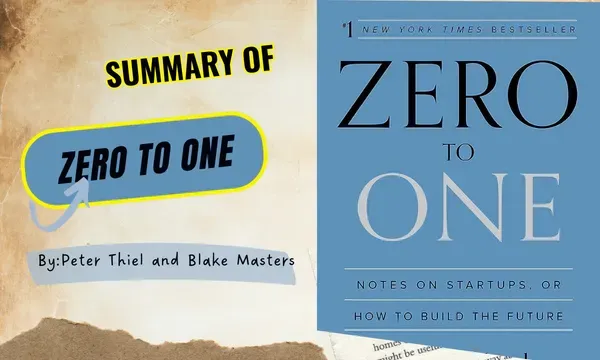Zero to One by Peter Thiel and Blake Masters focuses on the philosophy of creating innovative startups that aim to go from zero to becoming monopoly-like businesses, transforming industries and markets by creating entirely new products and technologies.
 |
| Summary of Zero to One by Peter Thiel and Blake Masters |
The general idea of the book Zero to One
- Monopoly vs. Competition: Thiel argues that monopolies are more desirable than competition, as they allow companies to capture and maintain long-term value, leading to technological advancement and innovation.
- Vertical Progress: The authors emphasize the importance of vertical progress, which involves creating something entirely new and groundbreaking rather than just incremental improvements.
- Technology and Innovation: Thiel stresses that technological breakthroughs are crucial for successful startups, as they enable rapid growth and differentiation from existing solutions.
- Secrets of Success: The book delves into concepts such as the importance of unique insights (secrets), unconventional thinking, and the ability to harness network effects for business success.
Zero to One book chapters
- The Challenge of the Future: Discusses the importance of creating new things rather than copying existing models.
- Party Like It's 1999: Contrasts the dot-com bubble with the state of entrepreneurship in the 21st century.
- All Happy Companies Are Different: Explores the idea that successful companies have unique attributes that set them apart.
- The Ideology of Competition: Critiques the belief that competition is always good and emphasizes the benefits of monopolies.
- Last Mover Advantage: Examines the advantages of being the last entrant in a market, particularly for technology companies.
- You Are Not a Lottery Ticket: Encourages entrepreneurs to be deliberate and focused in their startup ventures.
- Follow the Money: Discusses the relationship between business success and financial systems.
- Secrets: Explores the concept of secrets as unique insights that drive innovation.
- Foundations: Highlights the importance of building a strong foundation for a startup's growth.
- The Mechanics of Mafia: Discusses the startup culture and its parallels with a close-knit group.
- If You Build It, Will They Come?: Emphasizes the need for distribution strategies and marketing.
- Man and Machine: Explores the roles of humans and technology in shaping the future.
- Seeing Green: Discusses the role of clean energy in the future of innovation.
Zero to One Book Conclusions
- Monopoly Advantage: Strive to create innovative products that can lead to a monopoly-like position in the market.
- Technology Disruption: Focus on technology breakthroughs and vertical progress to stand out in a crowded market.
- Secrets and Uniqueness: Embrace unique insights and unconventional thinking to drive innovation.
About the author of Zero to One
Peter Thiel is a successful entrepreneur, venture capitalist, and co-founder of PayPal. Blake Masters was Thiel's student at Stanford and later co-authored the book based on Thiel's lectures on startups.
Zero to One book in relation to other books
Compared to other entrepreneurship and startup books, "Zero to One" stands out for its contrarian view on competition and its emphasis on creating transformative technologies rather than incremental improvements.
Zero to One book audience
Entrepreneurs, startup founders, investors, and anyone interested in innovative business strategies.
Reception and Critical Response
The book received positive reviews for its thought-provoking insights and unconventional ideas about startups and business growth.
Zero to One Book Publishing Date
Published by Crown Publishing Group in 2014.
Recommendations for other books
- "The Lean Startup" by Eric Ries: Focuses on iterative product development and lean methodologies.
- "Good to Great" by Jim Collins: Explores the factors that differentiate good companies from exceptional ones.
Create innovation that leads to monopolistic advantages, emphasizing technology breakthroughs and unique insights.
